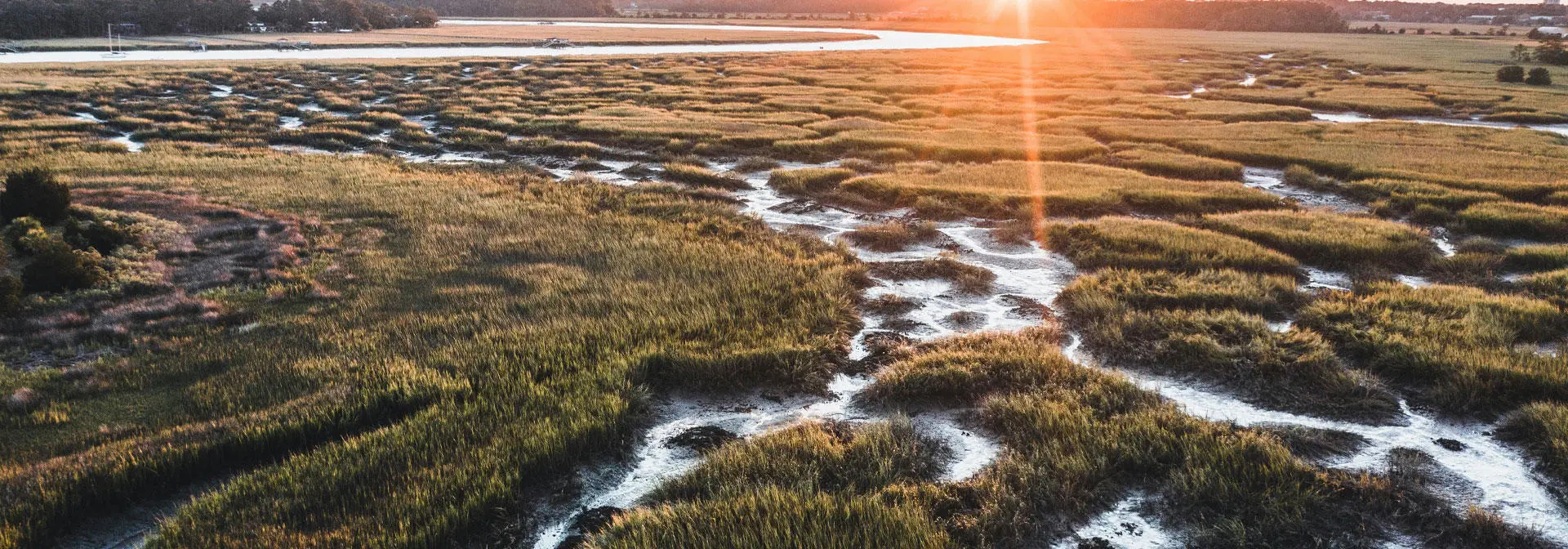Key information
This PhD project investigates the synergistic effects of multiple environmental stressors on estuarine hydro-ecological resilience—the capacity of estuaries to withstand and recover from disturbances while sustaining critical ecosystem functions and services.
- Funding
- Competition funded (Students worldwide)
- School
- Energy, Geoscience, Infrastructure and Society
- Location
- Edinburgh
- Award
- PhD
- Delivery type
- Full-time
- Supervisor
- Sandhya Patidar
- Closing date
- Friday, 9 January 2026
- Duration
- 44 months
This project is part of the NERC-funded Centre for Doctoral Training, ECOWILD.
For more details, and for a full list of projects offered under this programme, please visit: https://ecowild.site.hw.ac.uk/
Project Description
This PhD project investigates the synergistic effects of multiple environmental stressors on estuarine hydro-ecological resilience—the capacity of estuaries to withstand and recover from disturbances while sustaining critical ecosystem functions and services. Estuaries provide essential resources for human well-being, yet they are increasingly vulnerable to interacting pressures from climate change, water-quality degradation, over-abstraction, and habitat alteration driven by anthropogenic activities. These stressors rarely act in isolation; their combined effects can amplify ecological degradation in non-linear and poorly understood ways.
The project aims to address this key research gap by developing physics-informed, data-driven models capable of predicting how multiple stressors interact to influence estuarine conditions. Using a combination of multivariate statistical and machine-learning approaches—including covariance and correlation analyses, principal component analysis, and surrogate model development—the research will identify dominant stressor interactions that control water-quality and ecological responses. Historical and near-real-time datasets will be integrated to capture both long-term shifts and short-term dynamics in estuarine systems. Validated models will then be applied to scenario analyses to evaluate potential management and mitigation strategies, such as assessing water-quality deterioration under drought conditions or the compounded effects of abstraction and pollution. The outcomes will provide a framework for more adaptive and resilient estuarine management under climate and anthropogenic pressures.
The PhD student will be based at Heriot-Watt University (HWU) within an interdisciplinary research environment that bridges hydrology, ecology, and data science. They will receive advanced training in computational modelling, statistical analysis, and environmental systems thinking, with opportunities for collaboration and short research placements with partner organisations. This experience will equip the student with both technical and professional skills essential for a career in environmental modelling, sustainable water management, and policy-relevant research.
What do you need to know
This PhD project explores how multiple stressors—such as climate change, pollution, and habitat loss—interact to affect estuarine hydro-ecological resilience. While individual stressor effects are known, their combined and often non-linear impacts remain poorly understood. The student will develop and apply integrated data-driven and modelling approaches to predict these synergistic effects and support adaptive management. The supervisory team offers complementary expertise: Dr Sandhya Patidar (data science and statistical modelling, HWU), Dr Cédric Laizé and Dr Michael Hutchins (hydro-ecological and water-quality modelling, UKCEH), with external collaboration from Dr Rob Collins (The Rivers Trust) and stakeholders at SEPA and RSPB.
What expertise and skills will the student develop?
The student will develop strong interdisciplinary expertise combining data science (statistical, time-series, and machine learning methods) with hydro-ecology and water quality modelling to assess climate and multi-stressor impacts. They will gain advanced programming skills in R and Python for processing diverse hydro-ecological, water quality, and climate datasets, and learn to integrate data-driven and physics-based models. The project will strengthen critical thinking, problem-solving, and communication abilities, while providing experience in stakeholder engagement and interdisciplinary collaboration. The student will also build professional skills through conference presentations, publications, seminars, and outreach activities that enhance their academic and research profile.
Why is the project novel?
This project is novel in its integrated, multi-stressor approach to understanding estuarine resilience. Unlike prior studies focusing on single factors, it combines data-driven analytics and physics-based modelling to examine the synergistic effects of interacting stressors using diverse environmental datasets. The project will develop innovative diagnostic tools to capture long-term trends, short-term fluctuations, and scenario-based impacts under varying conditions. By engaging with partners and stakeholders, it will co-design risk mitigation and management strategies, enhancing the practical relevance of outcomes. This holistic framework will generate new scientific and policy insights to support sustainable estuarine conservation and climate resilience.
What real-life challenge does it address?
Estuaries face escalating pressures from pollution, habitat degradation, and climate change, with multiple stressors often interacting in complex, unpredictable ways. This uncertainty hampers the development of effective risk mitigation and restoration strategies. The project addresses this real-world challenge by advancing data-driven modelling to understand how estuarine systems respond to cumulative stressors and to predict future impacts. These predictive tools will support evidence-based decision-making for estuarine protection, resilience, and sustainable management. A key challenge lies in bridging science and practice—ensuring that research outcomes are aligned with the needs of policymakers, environmental managers, and coastal communities who depend on these vital ecosystems.
Timelines
The closing date for applications is 17:00 BST Friday 9 January 2026, and applicants must be available to start in October 2026.
Project supervisor
Lead Supervisor: Sandhya Patidar (Heriot-Watt University)
Stakeholder Supervisor: Rob Collins (The Rivers Trust)
Co-Supervisor 1: Cedric Laize (UK Centre for Ecology & Hydrology)
Co-Supervisor 2: Michael Hutchins (UK Centre for Ecology & Hydrology)
For more information on how to apply, please visit the ECOWILD website:
Project specific enquiries: S.Patidar@hw.ac.uk, General enquiries: ecowild@hw.ac.uk

Entry requirements
Candidate criteria
Eligibility
This project is available to home and overseas students. International candidates may apply but if successful, will need to demonstrate that they (or their supervisory team) have co-funding to cover the difference between home and international fees to be eligible. The difference in fees varies by programme. The current difference for 2025/26 academic year is approximately £20,000 per year.
Applicants typically should have a first or upper second-class honours degree or equivalent in an appropriate subject and preferably a relevant Masters’ qualification or similar experience.
We recognise that not every talented researcher will have had the same opportunities to advance their careers. We therefore will account for any particular circumstances that applicants disclose (e.g. parental leave, caring duties, part-time jobs to support studies, disabilities etc.) to ensure an inclusive and fair recruitment process.
Additional information
Essential Skills:
- Data analysis
- Modelling
- Communication skills across broad range of stakeholders
English language requirements
If your first language is not English, we'll need to see evidence of your English language ability.
The minimum English language requirement for entry to this programme is IELTS 6.5 (or equivalent) with no score lower than 6.0.
If you do not have IELTS 6.5, we offer a range of English language courses to help you meet the English language requirement for this programme prior to commencing your studies.
For more information about your application and our English Language requirements, please see Section 10 of our page on English Language Requirements as part of your application.
Funding information
This is a full scholarship which will cover tuition fees for Home students and provide an annual stipend in line with UKRI recommended levels (currently £20,780 in 2025-26) for the 44 months duration of the project.
International candidates may apply but if successful, will need to demonstrate that they (or their supervisory team) have co-funding to cover the difference between home and international fees to be eligible. The difference in fees varies by programme. The current difference for 2025/26 academic year is approximately £20,000 per year.
Why Heriot-Watt
We're the top university in Scotland for graduate outcomes which means that more of our graduates are employed or in postgraduate education than any other institution in the country and we ranked 5th in the UK.
We're also rated number one in the UK for CEO or MD roles, meaning more of our graduates go on to become CEOs or MDs than any other university in the whole of the UK. On top of that, we have beautiful campuses, across the globe, so you'll get a truly international education. Our Edinburgh Campus is home to Oriam, Scotland's National Sports Performance Centre combined with plenty of wellbeing resources, prioritising fitness and mental health for all students. Our Global Research Institutes look at solving real world issues such as climate change and saving our oceans as well as working on the next medical technological breakthrough and the future of AI and robots.
